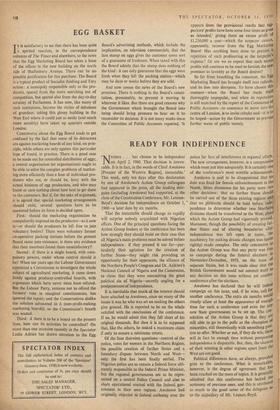EGG BASKET
IT 18 satisfactory to see that there has been quite a spirited reaction, in the correspondence columns of The Times and elsewhere, to the news that the Egg Marketing Board has taken a lease of the offices in the new building on the north side of Shaftesbury Avenue. There can be no possible justification for this purchase. The Board is a typical product of Socialist thinking and Tory action : a monopoly responsible only to the pro- ducers, spared from the more searching test of competition, but spared also from the day-to-day scrutiny of Parliament. It has now, like many of such institutions, become the victim of delusions of grandeur, taking this glossy building in the West End where it could just as easily (and much more sensibly) have taken up quarters outside London.
Controversy about the Egg Board tends to get confused by the fact that some of its detractors are against marketing boards of any kind, on prin- ciple, while others are only against this particular type of board, in practice. There is a good case to be made out for controlled distribution of eggs; a central organisation (or organisations) ought to be able to solve the complex problems of market- ing more efficiently than a host of individual pro- ducers who are, or should be, busy with the actual business of egg production, and who may know or care nothing about how best to get them to the customers. But if, for the sake of argument, it is agreed that special marketing arrangements should exist, several questions have to be answered before its form is decided upon.
First: should the marketing organisation be compulsorily imposed on the producers—as it now is—or should the producers be left free to join voluntary bodies? There were voluntary farmer co-operative packing stations before the present Board came into existence; is there any evidence that their members found them unsatisfactory?
Second : if there is a single board, with com- pulsory powers, under whose control should it be? When ten years ago the Labour Government appointed a Commission to investigate the whole subject of agricultural marketing, it came down firmly against producer-controlled boards, with arguments which have never since been refuted. But the Labour Party, anxious not to offend the farmers' vote in marginal constituencies, has ignored the report; and the Conservatives dislike the solution advocated in it (non-profit-making marketing boards); so the Commission's breath was wasted.
Third: if there is to be a board on the present lines, how can its activities be controlled? On more than one occasion recently in the Spectator Leslie Adrian has drawn attention to the Egg Board's advertising methods, which include the implication, on television commercials, that the lion stamp on eggs gives the customer some sort of a guarantee of freshness. When taxed with this the Board admits that the stamp does nothing of the kind : it can only guarantee that the eggs were fresh when they left the packing station—which may be days or weeks before they are sold.
And now comes the news of the Board's new premises. There is nothing in the Board's consti- tution, presumably, to prevent it moving in wherever it likes. But there are good reasons why the Government which brought the Board into being should bring pressure to bear on it to reconsider its decision. It is not many weeks since the Committee of Public Accounts reported, `It appears from the provisional results that egg' packers' profits have been some four times as great as intended,' giving them an excess profit of £1,250,000 a year—which the taxpayer cannot, apparently, recover from the Egg Marketing Board. Has anything been done to prevent a repetition of such profiteering at the taxpayer's expense? Or are we to expect that such excess profits will continue to be used to furnish the neW premises as lavishly as the Board desires?
So far from benefiting the consumer, the E88 Marketing Board has brought itself into ridicule, and its lion into disrepute. To have chosen this moment—when the Board has made itself thoroughly unpopular, and when its reputation is still smirched by the report of the Committee of Public Accounts—to announce its move into the centre of London, is to invite rebuke and—it is to be hoped—action by the Government to prevent further waste of public money.


































 Previous page
Previous page